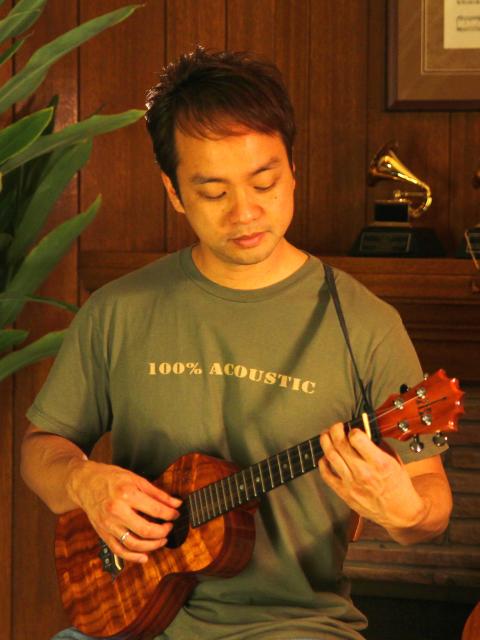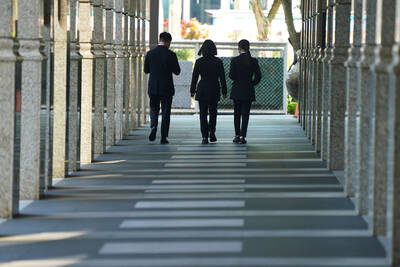Daniel Ho, the Hawaiian American world musician who was nominated in the Best Traditional World Album category for this year’s Grammy Awards, will perform a concert, On A Gentle Island Breeze, for the 55th Pre-Grammy Awards Music Party at Legacy Taipei (傳音樂展演空間) on Wednesday night.
Ho said the nominated album, On A Gentle Island Breeze (吹過島嶼的風), was inspired by a trip he made to Taitung in May of last year. He attended a barbecue banquet, drinking homemade millet wine and hearing Taiwanese Aboriginal music for the first time.
“This experience provided a rich foundation of ideas, motifs, and themes,” Ho told the Taipei Times in an email interview. “Three months later, the album was born.”

Photo courtesy of Wind Music
For the album, Ho wrote four original ukulele instrumental tracks about his impressions of Taiwan, blending Hawaiian and Taiwanese Aboriginal influences by collaborating with Taiwanese Aboriginal music acts including Golden Melody winning Ilid Kaolo, Puyuma songstress Hao-en (昊恩) and folk musicians Takanow and Long Ge (龍哥). Ho also delivered a ukulele rendition of Ocean (海洋) by Golden Melody award winner Pur-dur (陳建年).
Ho has won six Grammies. His 2011 album Polani was the first Ukulele album to be nominated in the award’s history.
“Working on this project was a wonderful gift,” Ho said about his latest triumph. “I was deeply inspired both musically and personally by the people of Taiwan.”

JUNE 30 to JULY 6 After being routed by the Japanese in the bloody battle of Baguashan (八卦山), Hsu Hsiang (徐驤) and a handful of surviving Hakka fighters sped toward Tainan. There, he would meet with Liu Yung-fu (劉永福), leader of the Black Flag Army who had assumed control of the resisting Republic of Formosa after its president and vice-president fled to China. Hsu, who had been fighting non-stop for over two months from Taoyuan to Changhua, was reportedly injured and exhausted. As the story goes, Liu advised that Hsu take shelter in China to recover and regroup, but Hsu steadfastly

Taiwan’s politics is mystifying to many foreign observers. Gosh, that is strange, considering just how logical and straightforward it all is. Let us take a step back and review. Thanks to the Chinese Nationalist Party (KMT) and the Taiwan People’s Party (TPP), starting this year people will once again have Christmas Day off work. In 2002, the Scrooges in the Democratic Progressive Party (DPP) said “bah, humbug” to that. The holiday is not actually Christmas, but rather Constitution Day, celebrating the enactment of the Constitution of the Republic of China (ROC) on December 25, 1947. The DPP and the then pan-blue dominated legislature

Focus Taiwan reported last week that government figures showed unemployment in Taiwan is at historic lows: “The local unemployment rate fell 0.02 percentage points from a month earlier to 3.30 percent in May, the lowest level for the month in 25 years.” Historical lows in joblessness occurred earlier this year as well. The context? Labor shortages. The National Development Council (NDC) expects that Taiwan will be short 400,000 workers by 2030, now just five years away. The depth of the labor crisis is masked by the hundreds of thousands of migrant workers which the economy absolutely depends on, and the

If you’ve lately been feeling that the “Jurassic Park” franchise has jumped an even more ancient creature — the shark — hold off any thoughts of extinction. Judging from the latest entry, there’s still life in this old dino series. Jurassic World Rebirth captures the awe and majesty of the overgrown lizards that’s been lacking for so many of the movies, which became just an endless cat-and-mouse in the dark between scared humans against T-Rexes or raptors. Jurassic World Rebirth lets in the daylight. Credit goes to screenwriter David Koepp, who penned the original Jurassic Park, and director Gareth Edwards, who knows